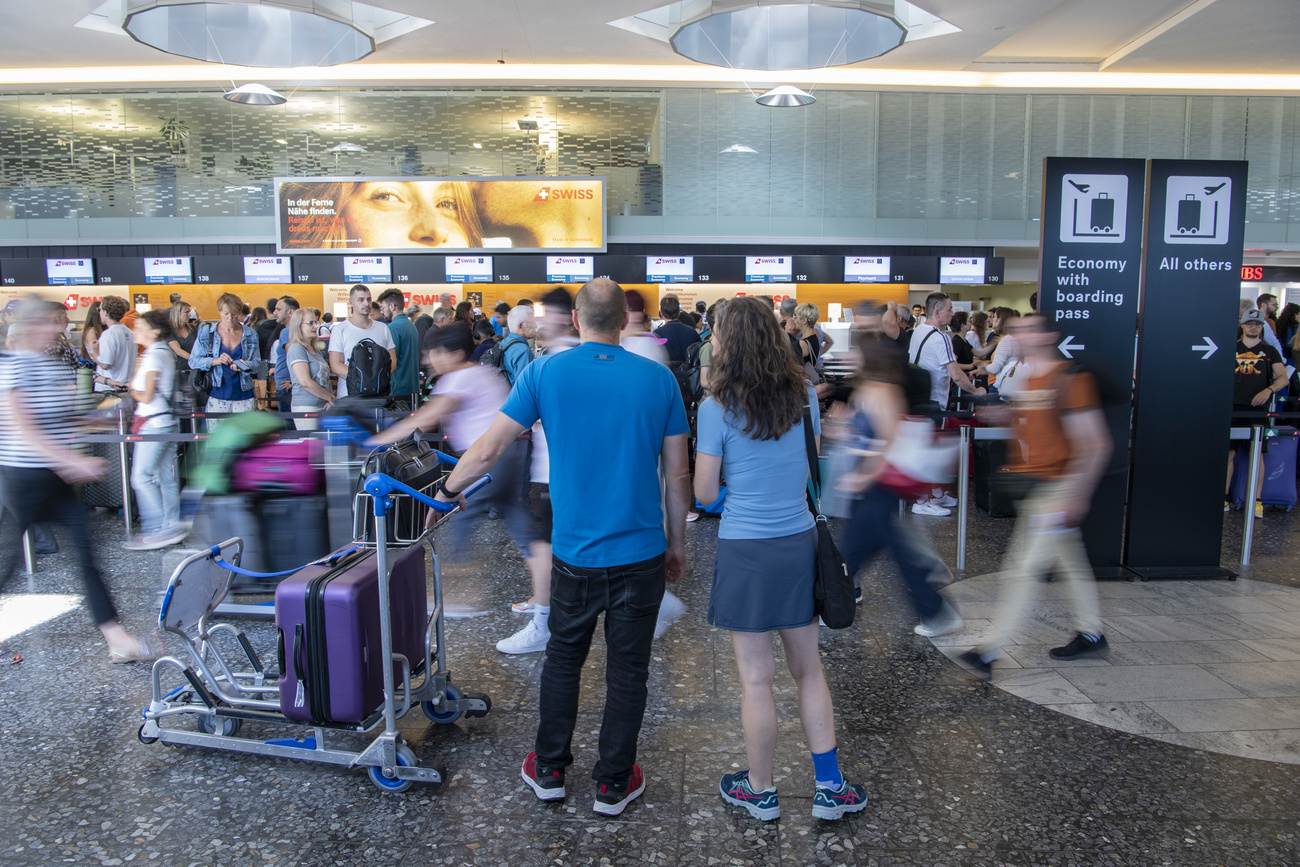
A spark of hope for Swiss descendants without a Swiss passport

Descendants of Swiss emigrants who have lost their Swiss passport are fighting a desperate battle to reclaim their citizenship. Now they are pinning their hopes on a little-known law.
Switzerland was once a nation of emigrants. In the 19th century, thousands of Swiss citizens moved overseas, which is why the number of descendants of Swiss emigrants is substantial. In South America alone, they number in the tens of thousands.
>>>The Swiss still have a great appetite for emigrating, but many of them return after spending a certain number of years abroad.

More
The Swiss Abroad in nine charts
These descendants may have Swiss roots, Swiss ancestors and often maintain a strong, mostly emotional connection to Switzerland. Yet over the generations, many have lost their Swiss citizenship.
A nearly unnoticed initiative
While the demands of Swiss emigrants’ descendants made headlines earlier this year – with 11,500 people signing a petition for easier access to the coveted red passport – another political initiative quietly slipped under the radar.
The motion came from Senator Carlo Sommaruga of the Social Democratic Party. He called for the creation of an additional special quota of residence permits to make working in Switzerland easier for descendants of Swiss emigrants who hold neither a Swiss passport nor citizenship of a country within the European Union or the European Free Trade Association (EFTA). The motion, however, stood no chance in the Senate.
The idea behind it was to remove the hurdles these descendants face when applying for a residence permit to spend more time in Switzerland, for example to work. As non-Europeans, they do not enjoy freedom of movement but instead fall under a quota system. For descendants of Swiss citizens from so-called third countries, access to the Swiss labour market is considered possible only within strict limits, or so it was assumed until now.

More
Thousands of emigrants’ descendants in Argentina demand Swiss citizenship
Special regulations for children of Swiss Abroad
But recently, another option has emerged. As revealed in the [government’s] response to two petitions by the Senate’s Political Affairs CommitteeExternal link, foreign-born children of Swiss citizens already have the right to obtain a residence permit under simplified conditions, if they are seeking reinstatement or facilitated naturalisation.
Upon request, the State Secretariat for Migration (SEM) has confirmed this. “There is a special legal provision for the admission of children of Swiss citizens today.” Employment is permitted under eased conditions according to article 29, paragraphs 2 and 3External link of the Ordinance on Admission, Residence and Employment (OASA) – without being subject to quotas or the requirement to give priority to Swiss or EU citizens, which is known as Inländervorrang.
This revelation has caught the attention of some descendants of emigrants who wish to regain their Swiss passport. It means that, after all, they can spend extended periods in Switzerland. “Until now, the main obstacle to regaining citizenship was the possibility to live legally in Switzerland without a passport,” writes Dylan Kunz, grandson of Swiss emigrants in Argentina.
But those hoping to regain citizenship or apply for facilitated naturalisation must have spent at least three years living in Switzerland, provided they missed earlier deadlines.
The Swiss law regulating how citizenship is passed on abroad is clear: children born abroad to Swiss parents lose their citizenship if they are neither registered with a Swiss representation nor entered into the Swiss civil registry by the age of 25, or 22 for those born before 1958. Once that deadline passes, descendants theoretically have ten years to apply for their citizenship to be reinstated.
If that deadline is missed, the only option left is to apply for reinstatement, provided the applicant has lived continuously in Switzerland for three years.
A glimmer of hope

The government took this fact into account when drafting the immigration regulations on admission requirements, the SEM’s response continues. “Foreign-born children of Swiss citizens can obtain a residence permit under simplified conditions, if they qualify for reinstatement of citizenship.”
However, applicants must demonstrate close ties to Switzerland, and there is no legal entitlement to a residence permit. “Refusing a residence permit would contradict the objectives of the Swiss Citizenship Act, as reinstatement in some cases requires residence in Switzerland,” the Committee’s response states.
“This is a significant step forward in our shared fight,” Kunz says looking optimistic.
But was Senator Sommaruga’s motion in vain? Indeed, he was unaware of the existing law, yet his proposal went even further. The existing special rule only applies to the first generation without Swiss citizenship.
The law should be extended
“My proposal targets everyone who can prove Swiss roots – beyond the first generation – and who maintains a link to Switzerland by engaging with the community of the Swiss Abroad and their descendants,” Sommaruga told Swissinfo upon request.
Still, this new development gives the “Nacionalidad Suiza para descendientes” community a major boost. “We will continue to advocate for this right to be extended to our grandchildren and future generations,” echoes from the Swiss Abroad community in Argentina. Each approval granted strengthens the arguments of Swiss expatriates’ descendants in the Swiss parliament.
Edited by Balz Rigendinger. Adapted from German by Billi Bierling/ds
More

More
Everything you need to know about the Swiss Abroad

In compliance with the JTI standards
More: SWI swissinfo.ch certified by the Journalism Trust Initiative






























You can find an overview of ongoing debates with our journalists here . Please join us!
If you want to start a conversation about a topic raised in this article or want to report factual errors, email us at english@swissinfo.ch.